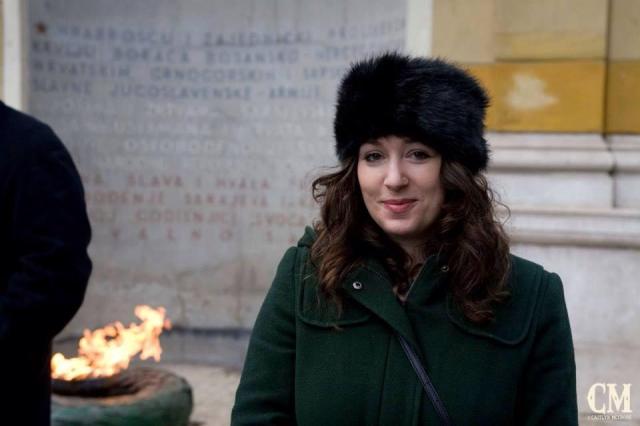

Today we post our final interview with a participant from the Sarajevo Study Trip. Shauna Aron is a SAIS Europe student working towards her MA in Conflict Management. She has worked on restorative justice projects in South Africa in the past, and was eager to study post-conflict reconstruction in another context. Here are some of her thoughts on the trip.
Why did you want to attend the Sarajevo Study Trip?
I am interested in post-conflict peace building, and looking at that also through a lens of gender studies, and how these issues affect women. I had spent some time in South Africa working in restorative and transitional justice, and also studied the Rwandan Genocide. Bosnia is conflict that I didn't know much about, and I believe it is fundamental when studying post-war peace-building.

Shauna Aron in Sarajevo
Which organizations did you enjoy visiting the most?
UNDP sparked my interest the most. Thomas Osorio, Advisor on the Rule of Law, presented on transitional justice in Bosnia. It's incredible that 18 years after this conflict, it's only the past five years that they are able to focus on transitional justice initiatives. Before they focused on criminal justice and redress through the court system, whereas now they're looking at goals such as reparations, victim-centered justice, and hopefully moving towards reconciliation. Currently, UNDP is launching a new transitional justice project, which addresses the needs of victims of sexual violence and rape as a tool of war, and for the first time this includes men. So it's a very interesting time in Sarajevo.
My second favorite organization was when we visited the women in Srebrenica. At that point we had learned the political, economic, and the social complexities in Bosnia, but when we met the women, the story was brought to life. You saw faces. It wasn't just statistics or names – they told real life stories and we had a deeper understanding of the conflict and challenges with peace-building in the region.
The pace of this trip was perfect. You had breaks at night to bond with other students on the trip, to learn about the culture of the city.
Tell us something new you learned about Bosnia and Herzegovina.
I was very surprised that 18 years after the conflict, there are three different truths told from different perspectives. The legacy of the Dayton Accords poses many political, economic, and social challenges for Bosnia today. As necessary as they may have been to stop the conflict, to an extent the Dayton Accords trapped Bosnia in a political structure that limits progress in many ways, such as hindering financial assistance and funding for development projects to reach the most vulnerable populations. The fact that three different constituent groups must be equally represented in every aspect of the political system makes it very challenging to serve those in the greatest need.
What future challenges for Bosnia and Herzegovina did you learn about?
The difficulty is the fact that the political structure is set up now in such a way that it creates further divisions. So it's harder to make progress and work toward accession to the EU. Serbia and its neighbors are moving in that direction, so they've never had a regional dynamic that was so positive for progress until recently. So the opportunity is there, but the political will and the structure are not.
How have the experiences you had on the trip impacted your studies?
There are strong parallels to peace-building in post-conflict societies, because when you analyze which mechanism to use, the trend moves in one of two directions: either tribunals which tend to focus on criminal justice, or truth commissions which elicit truth and move toward establishing a stable peace. But, the environment within the country must be conducive to these mechanisms. I think visiting a country in which you understand this context, makes you a more insightful academic and practitioner when you're analyzing post-conflict societies.
Did you enjoy meeting University of Bologna Students?
I loved going with a really diverse group of people. There were Italians from the University of Bologna, and others studying in Forli. We had a diverse group of Law and Conflict Management concentrations from SAIS, and I think it brought up really interesting discussion points, and helped us form friendships that we otherwise wouldn't have been able to do otherwise.
I felt that the Italians had a much more personal connection to the conflict as it happened right across the border. I think it was really powerful for them.